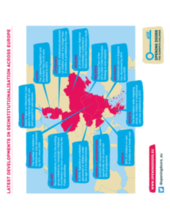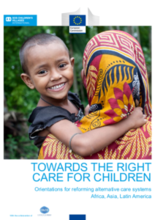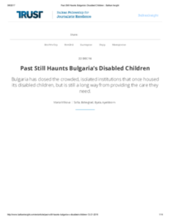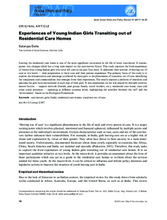Displaying 351 - 360 of 713
This infographic provides quick status reports on deinstitionalisation in the following countries: Estonia, Latvia, Lithuania, Ukraine, Moldova, Bulgaria, Greece, Serbia, Bosnia & Herzegovina, Hungary, Poland and Romania.
This report from Opening Doors discusses the Opening Doors II pan-European campaign launched in Chisinau.
This book presents the results of this research on more than 52,000 children placed in public care in Romania (in special protection) who receive family or residential-type protection services as well as on the children at risk of separation from their families from the source communities.
The Bulgaria Country Fact Sheet provides short details on the state of institutional care in Bulgaria.
This synthesis report contains findings of a study that conducted research in six South and Central American, Asian and African countries for the purpose of gaining understanding of the nature, extent, and scope of institutionalization and the feasibility of deinstitutionlisation.
This article discusses Bulgaria's challenges since the shut down of its crowded institutions, which housed disabled children.
As part of NOVA's look at childhood education, Dr. Charles Nelson came to this Boston Cafe Sci to share his research on the effects of early profound adversity on child and brain development.
This report documents the life experiences of care leavers in Australia.
The objective of the study was to estimate the prevalence, comorbidity and socio-demographic correlates of common mental disorders among orphan and vulnerable children (OVCs) in residential care.
This study captures the lived experiences of twenty-four young Indian girls who have left care in the past four years. It addresses their journey of moving out of care at two levels — their preparation to leave care and their present experience.







